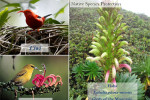Published in The Maui News, April 24, 2016
By DON GUZMAN, for The Maui News
Fighting invasive species such as the miconia weed, the little fire ant and the coqui frog takes diligence by everyone in the community.
That was one of the takeaway messages from the Maui Invasive Species Committee’s recent presentation to the Maui County Council’s Economic Development, Energy, Agriculture and Recreation Committee. MISC staffers Teya Penniman and Adam Radford provided council members with a status report on the coqui frog “invasion” and other invasive species issues.
MISC is a project of the University of Hawaii. Invasive species pose threats to Hawaii’s numerous endangered species, other native plants and animals, fragile ecosystems and our overall quality of life.
The Maliko Gulch area of Maui’s north shore is the site of a coqui frog infestation. The estimated total cost of the multiyear eradication project ranges from $4.6 million to more than $15 million depending on a variety of factors.
The eradication tactics include the strategic spraying of a 16 percent solution of citric acid and the removal and modification of frog-friendly habitat. MISC credits its partners – County of Maui, State of Hawaii, East Maui Watershed Partnership and Alexander & Baldwin – with supporting the effort in recent years.
MISC’s ability to implement its programs can be hampered by workers’ inability to access private properties where invasive species are reported. In addition, the introduction, or reintroduction, of pests from off-island locations poses challenges.
The Department of Agriculture hasn’t been provided sufficient resources to adequately inspect incoming plants.
The National Association of Counties recently reported that Maui County has 153 endangered and threatened species. So the fight against invasive species here is critical.
Members of the public can help by reporting instances of coqui frogs, little fire ants, miconia and other invasive species to MISC’s pest hotline at 643-PEST (643-7378). More information is available at mauiinvasive.org.
The Economic Development, Energy, Agriculture and Recreation Committee has plans to explore the concept of a “food hub cooperative” in the near future.
I recently visited Our Table Cooperative, a 58-acre farm in Sherwood, Ore., which has a variety of crops and livestock. Worker-members of the cooperative, other farmers in the area and consumers have formed a network that promotes the value of locally grown meals.

According to their website, Our Table Cooperative “promotes fair wages and prices, democratic decision-making and a communal investment in what we eat.” Worker-members oversee all operations, “from planting the fields and raising livestock to processing and sales.”
The food hub cooperative movement is growing throughout the country. With the upcoming loss of sugar cane production on Maui and longstanding concerns about food security in Hawaii, the time seems right to consider this innovative model of agriculture.
I urge those with experience or information in this burgeoning field to email me at don.guzman@mauicounty.us to share ideas.
At the recommendation of the Economic Development, Energy, Agriculture and Recreation Committee, the council recently passed Ordinance 4302, which establishes new policies for the use of parks and recreational facilities. The committee met six times on the legislation, which is intended to simplify the permitting process for the benefit of both park users and the Department of Parks and Recreation, and is now codified at Chapter 13.04A, Maui County Code.
* Don Guzman is the vice chair of the Maui County Council. He holds the council seat for the Kahului residency area. He is chairman of the council’s Economic Development, Energy, Agriculture and Recreation Committee and the Committee of the Whole. “Chair’s 3 Minutes” is a weekly column to explain the latest news on county legislative matters. Go to mauicounty.us for more information.










